- Clone
- H1.1 (See other available formats)
- Regulatory Status
- RUO
- Other Names
- Leukocyte immunoglobulin-like receptor, subfamily B, member 4 (Lilrb4), gp49, gp49B1, gp49B, ILT3
- Isotype
- Armenian Hamster IgG
- Ave. Rating
- Submit a Review
- Product Citations
- publications

-

C57BL/6 mouse bone marrow cells were stained with CD11b PerCP/Cyanine5.5 and CD85k (gp49 Receptor, clone H1.1) PE or Armenian hamster IgG PE isotype control (right). Data shown were gated on myeloid cell population.
| Cat # | Size | Price | Quantity Check Availability | Save | ||
|---|---|---|---|---|---|---|
| 144903 | 25 µg | 104€ | ||||
| 144904 | 100 µg | 249€ | ||||
gp49, also known as ILT3, gp49b1 or CD85k, is a 49 kD glycoprotein expressed on activated NK cells and myeloid cells. It structurally resembles killer inhibitory receptors (KIR). gp49B is a type I membrane protein belonging to the Ig superfamily and contains an immunoreceptor tyrosine-based inhibitory motif (ITIM), while gp49A is a truncated molecule without ITIM. Upon activation following interaction with integrin avb3, the cytoplasmic tail associates with SHP-1 and SHP-2, which results in downregulation of cell activation and cytokine production.
Product DetailsProduct Details
- Verified Reactivity
- Mouse
- Antibody Type
- Monoclonal
- Host Species
- Armenian Hamster
- Immunogen
- gp49B-Fc fusion protein
- Formulation
- Phosphate-buffered solution, pH 7.2, containing 0.09% sodium azide.
- Preparation
- The antibody was purified by affinity chromatography and conjugated with PE under optimal conditions.
- Concentration
- 0.2 mg/ml
- Storage & Handling
- The antibody solution should be stored undiluted between 2°C and 8°C, and protected from prolonged exposure to light. Do not freeze.
- Application
-
FC - Quality tested
- Recommended Usage
-
Each lot of this antibody is quality control tested by immunofluorescent staining with flow cytometric analysis. For flow cytometric staining, the suggested use of this reagent is ≤0.25 µg per million cells in 100 µl volume. It is recommended that the reagent be titrated for optimal performance for each application.
- Excitation Laser
-
Blue Laser (488 nm)
Green Laser (532 nm)/Yellow-Green Laser (561 nm)
- Application Notes
-
Clone H1.1 recognizes both gp49A and gp49B. Additional reported applications (for the relevant formats) include in vitro activation of gp49B to inhibit cytokine production. The LEAF™ or Ultra-LEAF™ purified antibody is recommended for functional assays (contact our custom solutions team).
-
Application References
(PubMed link indicates BioLegend citation) -
- Wang LL, et al. 2000. J. Immunol. 164:5215. (Activ)
- Product Citations
-
- RRID
-
AB_2561653 (BioLegend Cat. No. 144903)
AB_2561653 (BioLegend Cat. No. 144904)
Antigen Details
- Structure
- Type I membrane protein belonging to Ig superfamily
- Distribution
-
Myeloid cells, activated NK cells
- Function
- Inhibitory activity mediated by ITIM motif
- Interaction
- SHP-1 and SHP-2
- Ligand/Receptor
- Integrin αvβ3, collagen
- Cell Type
- Dendritic cells, NK cells
- Biology Area
- Immunology, Innate Immunity
- Molecular Family
- CD Molecules
- Antigen References
-
1. Castells, MC, et al. 1994. J. Biol. Chem. 269:8393.
2. Katz HR, et al. 1996. P. Natl. Acad. Sci. USA 93:10809.
3. Kuroiwa A, et al. 1998. J. Biol. Chem. 273:1070.
4. Wang LL, et al. 2000. J. Immunol. 164:5215.
5. Jiang L, et al. 2009. Eur. J. Immunol. 39:1167. - Gene ID
- 14728 View all products for this Gene ID
- UniProt
- View information about CD85k on UniProt.org
Related Pages & Pathways
Pages
Related FAQs
- What type of PE do you use in your conjugates?
- We use R-PE in our conjugates.
Other Formats
View All CD85k Reagents Request Custom Conjugation| Description | Clone | Applications |
|---|---|---|
| PE anti-mouse CD85k (gp49 Receptor) | H1.1 | FC |
| Purified anti-mouse CD85k (gp49 Receptor) | H1.1 | FC |
| Alexa Fluor® 647 anti-mouse CD85k (gp49 Receptor) | H1.1 | FC |
| TotalSeq™-A1007 anti-mouse CD85k (gp49 Receptor) | H1.1 | PG |
| TotalSeq™-C1007 anti-mouse CD85k (gp49 Receptor) | H1.1 | PG |
| TotalSeq™-B1007 anti-mouse CD85k (gp49 Receptor) | H1.1 | PG |
Customers Also Purchased
Compare Data Across All Formats
This data display is provided for general comparisons between formats.
Your actual data may vary due to variations in samples, target cells, instruments and their settings, staining conditions, and other factors.
If you need assistance with selecting the best format contact our expert technical support team.
-
PE anti-mouse CD85k (gp49 Receptor)

C57BL/6 mouse bone marrow cells were stained with CD11b PerC... -
Purified anti-mouse CD85k (gp49 Receptor)
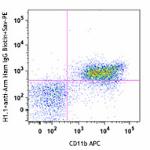
C57BL/6 mouse bone marrow cells were stained with CD11b APC ... 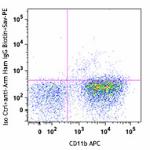
-
Alexa Fluor® 647 anti-mouse CD85k (gp49 Receptor)
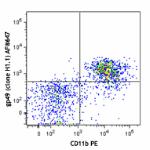
C57BL/6 mouse bone marrow cells were stained with CD11b PE a... 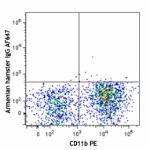
-
TotalSeq™-A1007 anti-mouse CD85k (gp49 Receptor)
-
TotalSeq™-C1007 anti-mouse CD85k (gp49 Receptor)
-
TotalSeq™-B1007 anti-mouse CD85k (gp49 Receptor)
 Login / Register
Login / Register 










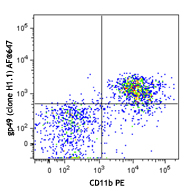

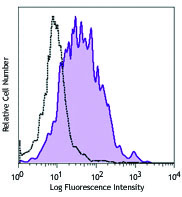
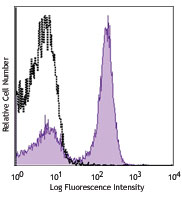



Follow Us